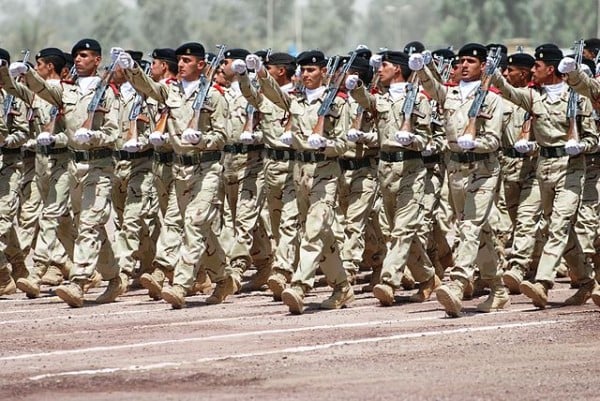
Iraqi security forces passed for review representing the leadership of the military ground forces, naval and air operations and the leadership in Baghdad and Diyala, Karbala, Basra and Samarra, also reviewed the units national police and the Rapid Intervention Force, and Special Assignments, June 30. Multi-National Security Transition Command Iraq Public Affairs Photo by Capt. Tommy Avilucea Date: 06.30.2009 Location: Baghdad, IQ
Dr. Mordechai Kedar, a prominent Middle East scholar at Bar Ilan University, told an audience at the Association of Americans and Canadians in Israel that the United States made a great mistake by not dividing Iraq into three states, one Kurdish, one Sunni, and one Shia. He believes that this mistake led to a situation where Al Qaeda is so close to taking over the Iraqi capital city.
“The modern Middle Eastern state was artificially created by colonialism and European rulers, who combined together many people that don’t live at peace with one another.” This is the situation in Iraq, Syria, Libya, Afghanistan, and many other states across the region. The European powers created these countries without taking into consideration the tribes that live in the area.
“Every tribe has a dialect in Iraq. They have their own militia, their own rules, their own everything,” he stressed. “Their daughters marry within the tribe. Aside from that, Iraq is a desert. Everything is dry in the desert. There, you must live as a tribe in order to survive. If you find a spring or a well, you must defend it. You need to fight to survive. This is their culture and heritage.”
He explained that tribal culture is not conducive to peace, as “the others are always the enemy.” Therefore, in such societies, the only way to create peace and stability is to have homogeneous states, like Kuwait, Qatar, and the United Arab Emirates. Those three countries are among the few Arab states that are actually stable and prosper.
Kedar explained that state law often contradicts tribal law and that the two aren’t compatible. He gave the example of a 23-year-old young woman who flirts with boys. According to state law, she is an adult and can make her own decisions about how to flaunt her sexuality. But according to tribal law, she has dishonored the family, tribe and clan. This shame can only be cleansed by her death from that perspective.
“The tribe always succeeds against the state,” Kedar emphasized. If one doubts this, one need not look further than the number of Iraqi soldiers that deserted Mosul. If they felt loyal to a country called Iraq, they would have staid and fought against Al Qaeda. However, their loyalties were to their tribes and clans. Why die fighting for something that they don’t believe in? “People are loyal to the tribe rather than to the state,” Kedar noted.
Aside from the tribal issues in Iraq, Kedar explained that the country is also full of religious tension, as Iraq is the home to 10 different religions. Among them are Muslims, Christians, Zoroastrians, Alawis, Druze, Bahais, etc. Kedar emphasized, “As we speak, Christians are getting killed and persecuted. Only a third of the Christians that existed in Sadamn Hussein’s Iraq are still in the country.” These tensions don’t even include the Shia-Sunni divide, which has been going on since the advent of Islam even though the Caliphate no longer exists, rendering the question of who his rightful successor should be to be almost irrelevant.
According to Kedar, “The only remedy will come when new homogeneous entities emerge. Good fences make good neighbors, especially when people are hostile to each other.” To illustrate this point, he noted that if you have two neighbors without a fence, they can learn to hate each other because one neighbors’ dog is chasing the other neighbors cat and one neighbors son is throwing his football into the other neighbors window. But if there is a fence, the cat can rest peacefully in the sun and the neighbors’ son will be only throwing his football at his own home rather than at the neighbors. This fence creates peace and stability.
“Why keep the borders? Why? They should go through the same process that the Soviet Union, Czechoslovakia and Yugoslavia did,” he concluded. Just as it took many years for democracy to be created in Europe, Kedar emphasized that it is unrealistic to expect democracy to emerge within Iraq in a couple of years. However, if there are three homogeneous states in what is now Iraq, there can be stability within the country.